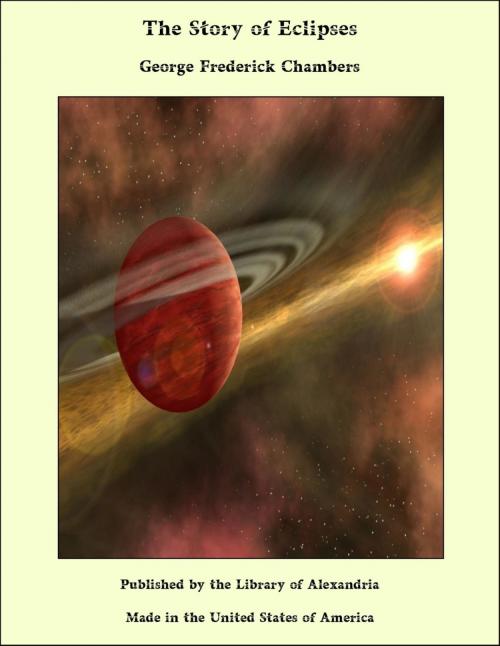| Author: | George Frederick Chambers | ISBN: | 9781465608604 |
| Publisher: | Library of Alexandria | Publication: | March 8, 2015 |
| Imprint: | Language: | English |
| Author: | George Frederick Chambers |
| ISBN: | 9781465608604 |
| Publisher: | Library of Alexandria |
| Publication: | March 8, 2015 |
| Imprint: | |
| Language: | English |
It may, I fear, be taken as a truism that “the man in the street” (collectively, the “general public”) knows little and cares less for what is called physical science. Now and again when something remarkable happens, such as a great thunderstorm, or an earthquake, or a volcanic eruption, or a brilliant comet, or a total eclipse, something in fact which has become the talk of the town, our friend will condescend to give the matter the barest amount of attention, whilst he is filling his pipe or mixing a whisky and soda; but there is not in England that general attention given to the displays of nature and the philosophy of those displays, which certainly is a characteristic of the phlegmatic German. However, things are better than they used to be, and the forthcoming total eclipse of the Sun of May 28, 1900 (visible as it will be as a partial eclipse all over Great Britain and Ireland, and as a total eclipse in countries so near to Great Britain as Spain and Portugal, to say nothing of the United States), will probably not only attract a good deal of attention on the part of many millions of English-speaking people, but may also be expected to induce a numerically respectable remnant to give their minds and thoughts, with a certain amount of patient attention, to the Science and Philosophy of Eclipses. There are other causes likely to co-operate in bringing this about. It is true that men’s minds are more enlightened at the end of the 19th century than they were at the end of the 16th century, and that a trip to Spain will awaken vastly different thoughts in the year 1900 to those which would have been awakened, say in the year 1587; but for all that, a certain amount of superstition still lingers in the world, and total eclipses as well as comets still give rise to feelings of anxiety and alarm amongst ill-educated villagers even in so-called civilized countries. Some amusing illustrations of this will be presented in due course. For the moment let me content myself by stating the immediate aim of this little book, and the circumstances which have led to its being written. What those circumstances are will be understood generally from what has been said already. Its aim is the unambitious one of presenting in readable yet sound scientific language a popular account of eclipses of the Sun and Moon, and (very briefly) of certain kindred astronomical phenomena which depend upon causes in some degree similar to those which operate in connection with eclipses. These kindred phenomena are technically known as “Transits” and “Occultations.” Putting these two matters entirely aside for the present, we will confine our attention in the first instance to eclipses; and as eclipses of the Sun do not stand quite on the same footing as eclipses of the Moon, we will, after stating the general circumstances of the case, put the eclipses of the Moon aside for a while.
It may, I fear, be taken as a truism that “the man in the street” (collectively, the “general public”) knows little and cares less for what is called physical science. Now and again when something remarkable happens, such as a great thunderstorm, or an earthquake, or a volcanic eruption, or a brilliant comet, or a total eclipse, something in fact which has become the talk of the town, our friend will condescend to give the matter the barest amount of attention, whilst he is filling his pipe or mixing a whisky and soda; but there is not in England that general attention given to the displays of nature and the philosophy of those displays, which certainly is a characteristic of the phlegmatic German. However, things are better than they used to be, and the forthcoming total eclipse of the Sun of May 28, 1900 (visible as it will be as a partial eclipse all over Great Britain and Ireland, and as a total eclipse in countries so near to Great Britain as Spain and Portugal, to say nothing of the United States), will probably not only attract a good deal of attention on the part of many millions of English-speaking people, but may also be expected to induce a numerically respectable remnant to give their minds and thoughts, with a certain amount of patient attention, to the Science and Philosophy of Eclipses. There are other causes likely to co-operate in bringing this about. It is true that men’s minds are more enlightened at the end of the 19th century than they were at the end of the 16th century, and that a trip to Spain will awaken vastly different thoughts in the year 1900 to those which would have been awakened, say in the year 1587; but for all that, a certain amount of superstition still lingers in the world, and total eclipses as well as comets still give rise to feelings of anxiety and alarm amongst ill-educated villagers even in so-called civilized countries. Some amusing illustrations of this will be presented in due course. For the moment let me content myself by stating the immediate aim of this little book, and the circumstances which have led to its being written. What those circumstances are will be understood generally from what has been said already. Its aim is the unambitious one of presenting in readable yet sound scientific language a popular account of eclipses of the Sun and Moon, and (very briefly) of certain kindred astronomical phenomena which depend upon causes in some degree similar to those which operate in connection with eclipses. These kindred phenomena are technically known as “Transits” and “Occultations.” Putting these two matters entirely aside for the present, we will confine our attention in the first instance to eclipses; and as eclipses of the Sun do not stand quite on the same footing as eclipses of the Moon, we will, after stating the general circumstances of the case, put the eclipses of the Moon aside for a while.















